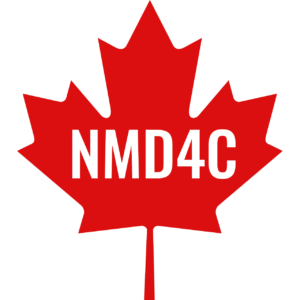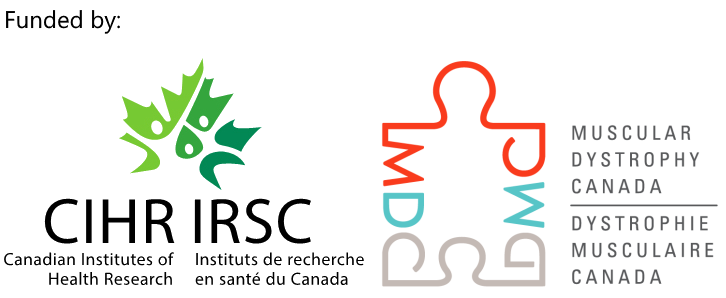Élise Duchesne

Working Group Member
Professor, School of Rehabilitation Sciences, Université Laval
Researcher, Groupe de recherche interdisciplinaire sur les maladies neuromusculaires (GRIMN)
NMD4C Involvement: Pillar 1: Preclinical Science, Pillar 2: Clinical Research
Email ÉliseResearch Interests: muscle plasticity, skeletal muscle physiology, macrophage, muscle biology / physiology, cell culture, innate immunity, flow cytometry, cellular immunology, muscle damage
Academic web profileGoogle Scholar profile
ORCiD profile
Biography
Dr. Duchesne graduated from Laval University’s physiotherapy program in 2006. Her passion for research led her to undertake a master’s degree followed by a Ph.D. from 2006 to 2012. Her thesis focused on skeletal muscle injuries, more specifically on the contribution of inflammation to the repair process. In January 2012, Dr. Duchesne was hired as a professor/researcher in the Université du Québec à Chicoutimi’s physiotherapy program.
As an independent researcher, her works focus namely on developing rehabilitation interventions. She carried out original and innovative experimental designs based on her knowledge in muscle physiology and her access to the large cohorts of NMD patients found in the Saguenay–Lac-St-Jean region such as myotonic dystrophy type I (DM1).
Her contributions to the field of neuromuscular diseases include the clinical and fundamental study of strength training effects on skeletal muscle impairments, the support of clinical trial readiness by reaching international consensus on outcome measures, the documentation of metrological properties, the documentation natural history of the disease and the establishment of a phenotypic data and biological material biobank.
Recent Publications
Roussel, MP, Ravel-Chapuis, A, Gobin, J, Jasmin, BJ, Leduc-Gaudet, JP, Gagnon, C et al.. Changes in Physiopathological Markers in Myotonic Dystrophy Type 1 Skeletal Muscle: A 3-Year Follow-up Study. J Neuromuscul Dis. 2024. PMID:39031377
Girard-Côté, L, Gallais, B, Gagnon, C, Roussel, MP, Morin, M, Hébert, LJ et al.. Resistance training in women with myotonic dystrophy type 1: a multisystemic therapeutic avenue. Neuromuscul Disord. 2024.40 38-51 PMID:38824906
Mahdavi, M, Prévost, K, Balthazar, P, Hus, IF, Duchesne, É, Dumont, N et al.. Disturbance of the human gut microbiota in patients with Myotonic Dystrophy type 1. Comput Struct Biotechnol J. 2024.23 2097-2108 PMID:38803516
Aoussim, A, Légaré, C, Roussel, MP, Madore, AM, Morissette, MC, Laprise, C et al.. Towards the Identification of Biomarkers for Muscle Function Improvement in Myotonic Dystrophy Type 1. J Neuromuscul Dis. 2023.10 (6)1041-1053 PMID:37694373
Di Leo, V, Lawless, C, Roussel, MP, Gomes, TB, Gorman, GS, Russell, OM et al.. Resistance Exercise Training Rescues Mitochondrial Dysfunction in Skeletal Muscle of Patients with Myotonic Dystrophy Type 1. J Neuromuscul Dis. 2023.10 (6)1111-1126 PMID:37638448
Conte, TC, Duran-Bishop, G, Orfi, Z, Mokhtari, I, Deprez, A, Côté, I et al.. Clearance of defective muscle stem cells by senolytics restores myogenesis in myotonic dystrophy type 1. Nat Commun. 2023.14 (1)4033 PMID:37468473
Davey, EE, Légaré, C, Planco, L, Shaughnessy, S, Lennon, CD, Roussel, MP et al.. Individual transcriptomic response to strength training for patients with myotonic dystrophy type 1. JCI Insight. 2023.8 (14) PMID:37318869
Morin, M, Hébert, LJ, Perron, M, Petitclerc, É, Lake, SR, Duchesne, E et al.. Psychometric properties of a standardized protocol of muscle strength assessment by hand-held dynamometry in healthy adults: a reliability study. BMC Musculoskelet Disord. 2023.24 (1)294 PMID:37060020
Nguyen, CDL, Jimenez-Moreno, AC, Merker, M, Bowers, CJ, Nikolenko, N, Hentschel, A et al.. Periostin as a blood biomarker of muscle cell fibrosis, cardiomyopathy and disease severity in myotonic dystrophy type 1. J Neurol. 2023.270 (6)3138-3158 PMID:36892629
Leduc-Gaudet, JP, Franco-Romero, A, Cefis, M, Moamer, A, Broering, FE, Milan, G et al.. MYTHO is a novel regulator of skeletal muscle autophagy and integrity. Nat Commun. 2023.14 (1)1199 PMID:36864049
See more on PubMed
